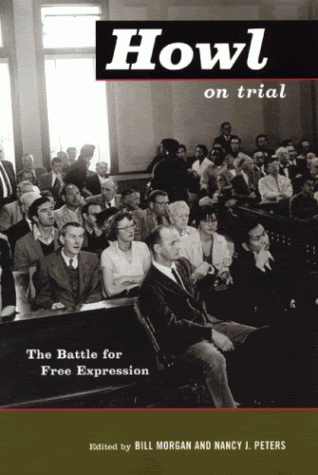 Howl on Trial
Howl on Trialedited by Bill Morgan & Nancy J. Peters
City Light Books, 2006
Allen Ginsberg's poem Howl was first published by the small press run by San Francisco's famous City Lights Bookshop in 1956. The books, printed in the UK, were seized by Customs as they entered the US on the grounds that they were obscene material. The seizure created enough press to justify a second edition, which City Lights owner Lawrence Ferlinghetti had printed locally so that Customs would have no authority. In 1957, undercover officers purchased a copy of the book at the bookstore and then brought charges against Ferlinghetti and the clerk that sold the book. The book was labeled obscene and banned. The court case that followed was one of about a dozen cases that changed America's strict obscenity laws so that books that employed gutter language and sexual imagery (frequently homosexual imagery) in pursuit of lofty literary goals could be sold in the Land of the Free.
Reading Howl, it isn't difficult to spot the passages that the censors may have objected to.
who lost their loveboys to the three old shrews of fate the one eyed shrew of the heterosexual dollar the one eyed shrew that winks out of the womb and the one eyed shrew that does nothing but sits on her ass and snip the intellectual golden threads of the craftman's loom,
who copulated ecstatic and insatiate with a bottle of beer a sweetheart a package of cigarettes a candel and fell off the bed, and continued along the floor and down the hall and ended faiting on the wall with a vision of ultimate cunt and come eluding the last gyzym of consciousness,
who sweetened the snatches of a million girls trembling in the sunset, and were red eyed in the morning but prepared to sweeten the snatch of the sunrise, flashing buttocks under barns and naked in the lake,
who went out whoring through Colorado in myriad stolen night-cars, N. C., secret hero of these poems, cocksman and Adonis of Denver -- joy to the memory of his innumerable lays of girls in empty lots & diner backyards, moviehouses' rickety rows, on mountaintops in caves or with gaunt waitresses in familiar roadside lonely pettycoat upliftings & especially secret gas-station solipsisms of johns, & hometown alleys too, (...)
In the end, the publishers convinced the court to rule that Howl was a serious work of literature, to add support to the legal precedent set during the Ulysses obscenity trial that held that an artistic work must be judged as a whole and not on the basis of a few passages taken out of context, and slam the door on the argument that a serious work of literature could be banned entirely because it was unsuitable for children.
Howl on Trial is a fantastic record of these historical events. It contains some historical perspective -- an introduction by Ferlinghetti, a timeline of important dates in the history of censorship, etc. -- but the genius of the book is that it tell most of its story through primary source material. It contains the text of Howl, news articles, editorials and criticisms by famous critics, letters to the editor by ordinary San Francisco citizens both in support of and in opposition to the poem, and the full transcript of the trial.
This is going to be a short review since there isn't much to review. You can't exactly criticize a court transcript based on its literary merit! If you are interested in history, if obscenity trials interest you as much as they interest me, you will find this account as fascinating as I did.
I have only one complaint that I wish the book had addressed. It is all well and good that Howl was ruled to be literature and not smut -- and therefore not subject to censorship. But what about the smut? Neither the historical figures, nor the historians who contribute their opinions stand up for the rights of authors and publishers to publish obscene material that doesn't have literary value. That omission makes me think we might not have come as far since 1957 as we think we have.
Personally, I love how many times on court record the prosecutor implied or said pretty directly that he didn't know anything at all about literature. It makes the censorship lobby sound borderline illiterate... strangely enough.
ReplyDeleteAlso, for how many times the prosecutor and various editorialists used, "Think of the children!" they really should have been challenged to find a child who had read Allen Ginsberg.